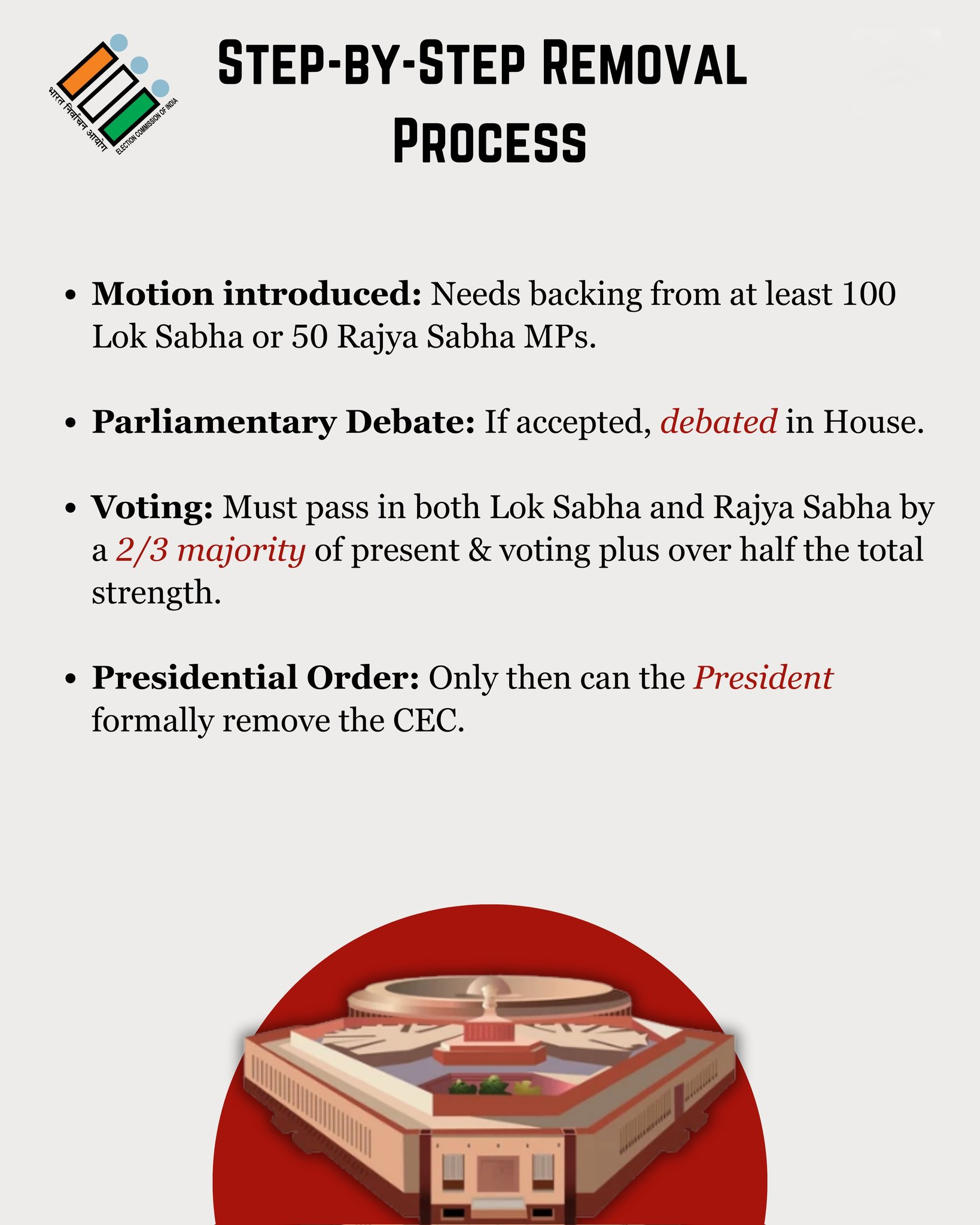Context:
The INDIA bloc is contemplating a motion in Parliament to seek the removal of Chief Election Commissioner (CEC) Gyanesh Kumar. The decision follows his recent press conference where he accused the Opposition of "spreading misinformation" regarding the Special Intensive Revision (SIR) of electoral rolls in Bihar.
About Election Commissioners of India:
- The Chief Election Commissioner (CEC) is the head of the Election Commission of India (ECI), which is a constitutional body (article 324) responsible for administering elections in the country. The CEC oversees the conduct of free, fair, and impartial elections to the following:
· Lok Sabha (House of the People)
· Rajya Sabha (Council of States)
· State Legislative Assemblies and Councils
· President and Vice-President of India
- The powers and responsibilities of the Election Commission are enshrined in Article 324 of the Constitution of India, which vests the Commission with the superintendence, direction, and control of the electoral process across India.
- The CEC, along with two Election Commissioners, forms a multi-member Commission (since 1993), and all decisions are taken by majority vote among the three.
Appointment and Term:
- Under the CEC and Other ECs (Appointment, Conditions of Service and Term of Office) Act, 2023, Election Commissioners are appointed by the President on the recommendation of a three-member panel: the Prime Minister, Leader of Opposition in Lok Sabha, and a Union Cabinet Minister. Their tenure is six years or until the age of 65, whichever is earlier.
- About Chief Election Commissioner and Other Election Commissioners (Appointment, Conditions of Service and Term of Office) Act, 2023:
- The 2023 Act replaces the 1991 Act to regulate the appointment, tenure, and conditions of service of the Chief Election Commissioner (CEC) and Election Commissioners (ECs).
· It follows the Supreme Court’s judgment in the Anoop Baranwal case (2023), which mandated a selection panel of the Prime Minister, Leader of Opposition (LoP), and Chief Justice of India (CJI) to ensure neutrality in appointments.
· The 2023 Act, however, replaces the CJI with a Union Cabinet Minister, prompting legal and constitutional challenges.
Procedure of Removal:
· Grounds: Proven misbehaviour (e.g., corruption, abuse of office) or incapacity.
· Initiation: A motion must be introduced in either House with support of at least 50 MPs in rajya Sabha and 100 members in Loksabha.
· Inquiry: A judicial committee investigates and validates charges.
· Voting: Requires a two-thirds majority in both Houses.
· Presidential Action: The President must act once Parliament approves—no discretion allowed.
· Other ECs: Can only be removed on the CEC’s recommendation, ensuring autonomy.
Notably, no CEC has ever been removed since independence, highlighting the constitutional safeguards that protect the Commission’s integrity.
Conclusion:
This controversy highlights the need for transparency and public trust in constitutional institutions in a democracy. Institutions like the Election Commission must work while maintaining their impartiality so that their credibility is not questioned. Also, political parties must follow facts and procedures while criticising. Such dialogues make the democratic system more accountable and strong.







